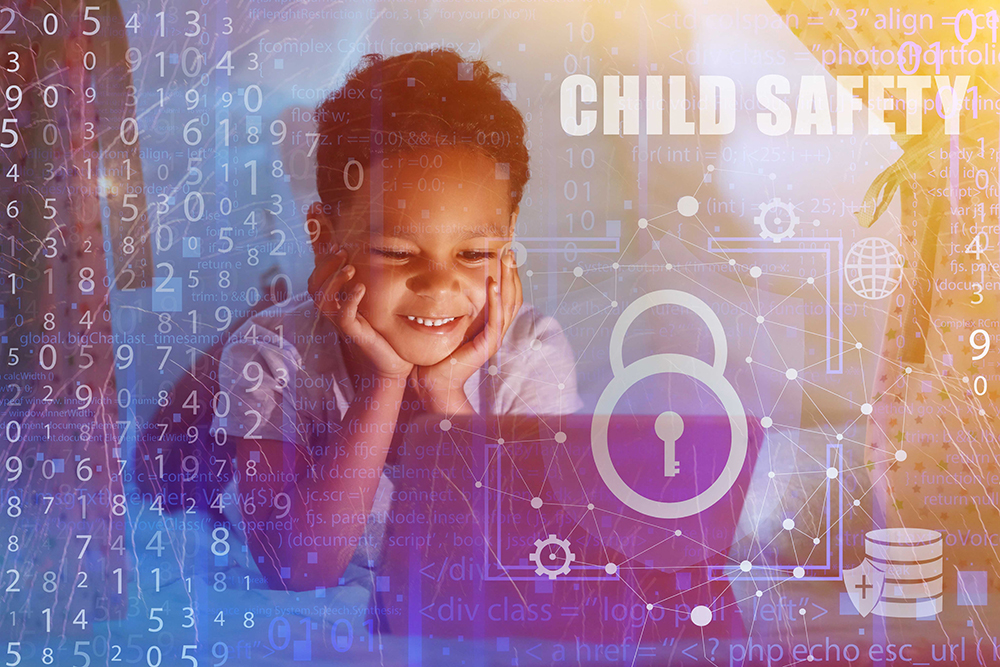Balancing children fun and safety online
In a world that is rapidly evolving, thanks to the digital era, ensuring children like Karungi grow up with the right balance of exploration and safety is paramount. While technology opens one door of creativity and learning, it also opens another with risks that must be navigated cautiously.
Siblings using a digital tablet while lying on sofa in living room

Hannington Mutabazi
Journalist @New Vision
____________________
Seated on a couch, with legs folded, Kisha Martha Karungi scrolls through her tab. One minute, she is playing a game, the next, she is giggling at TikTok videos saved on her tablet. Her other siblings watch on impatiently for a chance to play a game or rewatch the videos on the tablet.
The eight-year-old Primary Three pupil lives with her siblings – Precious Nyange (9) in Primary Four, and Shanita Alinaitwe and Martha Kagaiga (both 12), in Primary Six in Kikajjo-Namasuba, Wakiso District, central Uganda.
▪️ Anglican Church launches campaign to protect children online

Until her tablet's battery runs dry, she restlessly tingles with excitement. Sometimes, it takes a roar from her mother, Christine Mbabazi or aunt Mercy Bonabana to drop the tablet and quickly run to finish her chores.
Karungi is my niece, and recently, when I was at home, I had a conversation with her and my other little siblings, along with another niece. Due to their interest in my phone and those of my other relations, I asked them what they loved most about mobile phones.
One by one, they answered my questions, and each of them expressed their love for playing games and watching TikTok videos.
It was Karungi’s response that got me intrigued, prompting me to ask her some more questions. When I asked what she enjoyed most on a phone or her tablet, she mentioned watching TikTok videos—especially those by Taata Kimbowa, a local TikTok skit comedian. She also enjoys playing games, not to mention working on her math exercises.

Until recently, Karungi had a TikTok account and the app installed on her tablet. However, her mother uninstalled it because it was taking up too much space on the device, though she promised to reinstall it later.
Her mother was also concerned that her teenage aunts, who had now gone back to school, had taken over her tablet. She worried that what they viewed might not be appropriate for little Karungi.
Karungi proudly owned a TikTok account, with her older aunts helping her create content, especially dance videos. If you search for her account, you’ll find a few clips of her dancing or re-acting popular trends.
These videos have garnered a few views and likes, mostly from relatives. It’s now been over a year since anything was posted on her account. Even before her mother removed the app, Karungi’s viewing was closely supervised, and she was occasionally warned about the type of content she watched.
Now that the app is no longer available, and she has rewatched all the saved videos on her tablet multiple times, Karungi enjoys sneaking peeks at her uncle Joshua Murungi’s TikTok, as well as her other uncle Innocent Byemaro’s and occasionally her aunt Bonabana’s.
▪️ Keeping your children safe to learn online

Karungi’s consumption of digital content is undoubted, but in this era of rapid technological advancements, the concern for children’s digital rights and protection is growing.
At home, screen time is a privilege, not a given. Tab time is strictly restricted until Karungi and her siblings finish their chores. No one is allowed to fiddle with a tablet or even touch anyone’s phone until responsibilities are completed.
“In a 24-hour day, the children may only spend two hours playing on their tablets, and even then, access is limited,” says their aunt, Bonabana.
Of the four young ones, only Karungi and Precious own tablets. Their other siblings depend on the goodwill of the two to squeeze in a quick game or catch a few videos.
Internet access at home is also limited, leaving the children restricted to offline games most of the time. When they do watch TikTok content, they gravitate towards child celebrities, comedy skits, and trendy music challenges.
Aunt Bonabana is cautious about their digital habits. She not only monitors screen time but also constantly reminds them of what they can and cannot watch.
“I always caution them about the kind of things they watch,” she explains. “I also make sure their screen time is controlled.”
▪️ How to introduce digital tools to children responsibly

“From my observations, I believe it’s crucial for parents to have open conversations with their children. Times have changed, and so have the problems children face. It’s important to sit down and explain their limits, giving justifiable reasons behind each rule—especially regarding issues like online bullying or inappropriate content,” Bonabana elucidates.
She says children should be taught about the dangers of the digital world, but guidance alone isn’t enough.
“Today’s technology offers numerous parental control options for games, apps, and internet browsing. Parents should not only communicate but also implement these safeguards as an extra layer of protection. After all, verbal warnings may not always be enough to ensure children stay within their boundaries,” Bonabana advises.
As children increasingly get acquainted with digital spaces from an early age, the need to safeguard their rights within these environments has become urgent to help maintain a social and prosperous society.

According Digital Cooperation Organization (DCO) policy paper, Safe Digital Space for Children, globally, approximately one-third of the internet’s user base comprises children under the age of 18 (as of 2019/2020), highlighting the significant presence of young individuals in the digital realm.
An increasing amount of evidence suggests that children are gaining access to the internet at progressively younger ages.
“In certain nations, children under the age of 15 are just as likely to use the internet as adults over the age of 25. Smartphones are contributing to a ‘bedroom culture’, where online access for many children is becoming more personal, private, and less supervised,” reads the policy paper.
Excessive exposure to technology in the early ages can adversely affect the mental health of children with depression being one of the big concerns. The impacts extend to other fundamental health and social issues, such as the impact on vision, and the development of interpersonal skills.
“Regarding interpersonal skills, excessive dependence on technology can lead to increased isolation and hinder the positive personality development of a child. Since children are still in the process of forming their identity, the negative impacts can have a much more pronounced effect on them compared to adults,” reads part of the policy paper.
Ensuring children's online safety
During a session on Safe Digital Spaces for Children at the 2024 Internet Governance Forum (IGF) in Riyadh, Saudi Arabia, Afrooz Kaviani Johnson, a child protection specialist with UNICEF, outlined key challenges and solutions for ensuring the online safety of children.
A baby girl watching cartoons on a tablet
Johnson emphasized the need for a comprehensive approach to safeguarding children's rights in the digital realm. She pointed out that one significant issue is the design and governance of digital platforms.
Many platforms prioritize user engagement over child protection, which can lead to the rapid spread of harmful content. To address this, she urged governments and regulators to require the tech sector to implement Child Rights Impact Assessments.
Additionally, she noted that technological advancements have outpaced legislation, creating gaps in how online violence is addressed. Johnson called for governments to update laws to adequately criminalize online offences and ensure that policies are future-proofed to keep pace with evolving technologies.
She advocated for strengthened support for law enforcement agencies, educators, social services, and mental health resources, enabling them to better identify, respond to, and prevent online harm.
Johnson also highlighted how harmful social norms and limited public discussions create barriers to seeking help.
To combat this, she stressed the importance of broader educational initiatives that challenge harmful norms, promote healthy relationships, and encourage help-seeking behaviour. Furthermore, she encouraged educating parents, caregivers, and peers on how to support children.
Uganda’s children safety policies
In Uganda, several policies aim to protect children's online safety, including the National Child Policy (2020) and the Children (Amendment) Act (2016), which addresses online exploitation indirectly.
Cyber laws like the Computer Misuse Act tackle issues such as cyberstalking but do not explicitly protect children from online predators. Organizations like the Internet Society Uganda promote digital safety awareness through educational initiatives.
However, challenges remain due to limited public awareness and inadequate support systems, highlighting the need for improved legislation, education, and collaboration among stakeholders to enhance children's safety in the digital space.
Child safety online is paramount
In a world that is rapidly evolving, thanks to the digital era, ensuring children like Karungi grow up with the right balance of exploration and safety is paramount. While technology opens one door of creativity and learning, it also opens another with risks that must be navigated cautiously.
It’s the role of parents, guardians and society to equip children with not just tools to enjoy the digital world, but also the wisdom to navigate it. After all, every swipe and click is an opportunity—either for learning or risk.
By paying attention and being involved in children’s online activities, Karungi or any other child’s giggles at TikTok videos are backed by protection, support, and care.